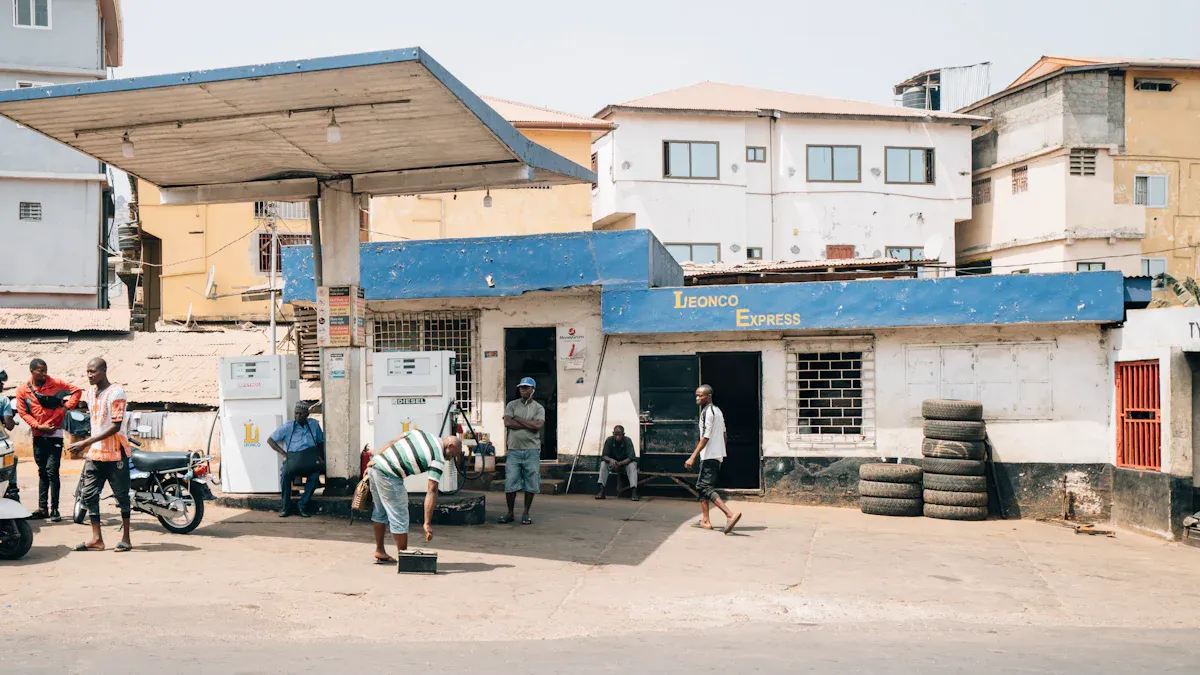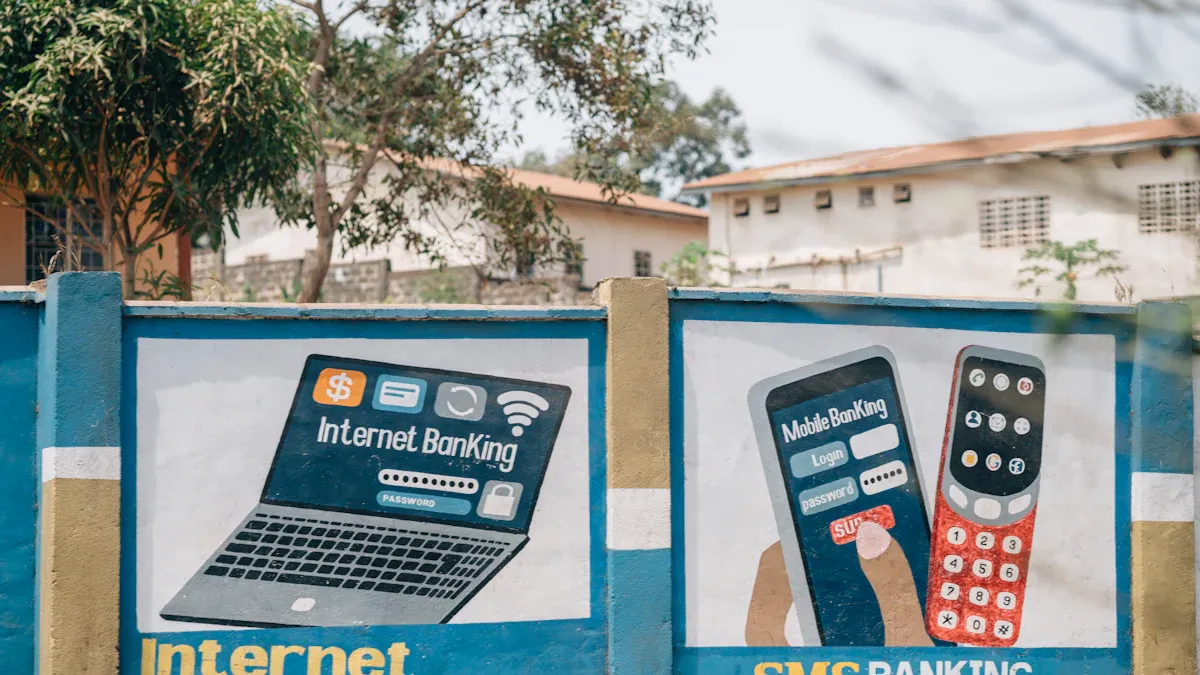- EasyCard
- Trade
- Help
- Announcement
- Academy
- SWIFT Code
- Iban Number
- Referral
- Customer Service
- Blog
- Creator
Sierra Leone Currency: A Comprehensive Analysis of Exchange, Remittance and Financial Supervision

Image Source: unsplash
When handling currency exchange and remittance in Sierra Leone, choosing official channels like banks is crucial. Remittances are significant to the economy, with World Bank data showing remittance inflows accounted for 4.3569% of GDP in 2020. Recent changes to Sierra Leone’s currency (SLE/SLL) also impact tourists and business travelers.
Key Note: Adhering to Bank of Sierra Leone (BSL) regulations is the only way to ensure fund safety and compliance. Official channels are the preferred choice for all financial transactions.
Key Points
- In Sierra Leone, people should use official channels like banks for currency exchange and remittances to ensure fund safety and transaction compliance.
- Sierra Leone has replaced the old currency by removing three zeros, introducing the New Leone (SLE), and people need to distinguish between new and old currency denominations during transactions.
- People can send money to Sierra Leone from abroad using international remittance operators or bank wire transfers, but each method varies in speed and fees.
- Sierra Leone has strict cash entry/exit regulations; individuals cannot carry more than $10,000 in cash out of the country, and all large transactions must go through banks.
- The Bank of Sierra Leone (BSL) regulates all financial activities, and people must comply with its anti-money laundering (AML) regulations and provide necessary documents for any currency transactions.
Sierra Leone Currency Overview
Understanding Sierra Leone’s currency (Leone) is the first step for any financial activity. Recent currency reforms have a direct impact on all visitors.
Conversion of Old to New Leone
To address long-term inflation and simplify transactions, Sierra Leone officially launched the New Leone (SLE) on July 1, 2022. The core of this reform is a “remove three zeros” policy, where 1 New Leone (SLE) equals 1,000 Old Leones (SLL). During the transition, both currencies circulated, but the market has now largely shifted to the New Leone. Tourists and business travelers must pay attention to whether price tags refer to SLE or SLL to avoid confusion.
Current Circulating Denominations
The Bank of Sierra Leone (BSL) issued the New Leone banknote series to enhance portability and durability. Currently circulating banknote denominations include:
- 1 Leone
- 2 Leones
- 5 Leones
- 10 Leones
- 20 Leones
The 20 Leone is a new high-denomination note introduced in this reform, facilitating larger cash payments. Understanding these denominations helps you adapt quickly to daily transactions.
Official Exchange Rate System
Sierra Leone’s currency operates under a managed exchange rate regime, not fully floating. This means the Bank of Sierra Leone intervenes based on market conditions to maintain relative rate stability. Historically, the country’s exchange rate system has been adjusted multiple times, often leaning toward official management rather than market-driven rates. Thus, the officially published rate is the only benchmark for legitimate transactions.
How to Check the Official Rate?
For the most accurate rate information, refer directly to the daily official data published by the Bank of Sierra Leone (BSL).
You can visit their website for daily official exchange rate postings:
https://www.bsl.gov.sl
Currency Exchange Practical Guide

Image Source: unsplash
In Sierra Leone, exchanging foreign currency for local currency is a straightforward, regulated process. Knowing official channels and standard procedures is key to ensuring safe and fair-rate transactions. The Leone is a freely convertible currency, offering convenience for tourists and business travelers.
Official Exchange Channels
When exchanging currency, always choose institutions authorized by the Bank of Sierra Leone (BSL). These channels ensure transaction legality and fund safety.
Main official exchange channels include:
- Commercial Banks: Major commercial banks are the most reliable option, offering standardized services and official rates with the highest safety.
- Licensed Forex Bureaus: Found in major cities and tourist areas, these bureaus often have more flexible hours and faster processes. Ensure they hold a valid BSL license.
Risk Warning: Avoid Black Market Transactions
At airports, hotels, or on the street, individuals may offer “better” rates for private exchanges. These unofficial (black market) transactions carry significant risks, including receiving counterfeit currency, fraud, or robbery, and may violate local laws. For your financial and personal safety, always use official channels for all currency exchanges.
Exchange Process and Documents
The exchange process at official channels is clear and transparent. Typically, you follow a few simple steps to complete the exchange.
Standard Exchange Process:
- Visit a bank or licensed forex bureau.
- Present required identification documents.
- Specify the amount to exchange and confirm the day’s rate.
- Complete the transaction, receiving Sierra Leone currency cash and a transaction receipt.
Required Documents Typically Include:
- Valid passport original
- Sierra Leone visa or entry stamp
Bank Operating Hours Note that banks have limited hours. Planning your exchange activities in advance is important. Most commercial banks’ forex services operate:
- Monday to Friday: 8:30 AM to 3:00 PM
- Saturday and Sunday: Closed
Rate Differences and Fees
Different exchange channels vary slightly in rates and handling fees. Understanding these helps you make the best choice.
Rate Differences Banks and forex bureaus base rates on the BSL’s official mid-market rate but may vary slightly.
| Exchange Channel | Rate Characteristics | Advantages |
|---|---|---|
| Commercial Banks | Closest to official posted rates, high transparency | Highest safety, ideal for large exchanges |
| Licensed Forex Bureaus | May offer slightly better rates, but compare carefully | Fast process, convenient locations |
Handling Fees (Commission/Fees) Most exchange services charge a fee, either as a percentage of the transaction amount or a fixed fee (e.g., a few USD equivalent per transaction). Before confirming, ask about all fees and the exact amount you’ll receive.
Pro Tip: Before exchanging, ask clearly, “If I give you $100, how many New Leones will I receive?” This helps you understand the actual rate after all fees.
Cross-Border Remittance Comprehensive Guide

Image Source: unsplash
Whether supporting family or making business payments, cross-border remittances are vital for financial interactions with Sierra Leone. Understanding the correct methods for sending money into and out of Sierra Leone ensures efficiency and compliance.
Sending Money into Sierra Leone
There are multiple options for sending money to Sierra Leone, primarily divided into international remittance operators and traditional bank wire transfers.
1. International Remittance Operators (MTOs)
For users prioritizing speed and convenience, services like Western Union, MoneyGram, Ria Money Transfer, and WorldRemit are ideal. They have extensive agent networks in Sierra Leone, allowing recipients to collect cash easily.
- Key Provider Features:
- Western Union: Senders can initiate transfers via the website, app, or in-person agents. Recipients can choose direct bank deposits or cash pickup at nationwide locations.
- Ria Money Transfer: Known for lower fees and transparent rates, senders can operate online, and recipients can collect cash or deposit to mobile wallets in as little as 15 minutes.
- WorldRemit: Supports transfers from Australia, Canada, the US, UK, and some European countries to Sierra Leone, offering diverse delivery options.
If the recipient chooses cash pickup, the process is simple:
- Find a Location: Use the provider’s online tool to locate the nearest agent.
- Prepare Information: Bring a valid photo ID and the sender-provided tracking number (e.g., MTCN).
- Fill Out Form: Complete a simple receipt form with transfer details at the agent.
- Collect Cash: Submit the form and ID to the agent for verification, then receive cash and a receipt.
2. Bank Wire Transfer (SWIFT)
International wire transfers via the SWIFT system are a traditional, reliable option, especially for large transfers. For example, senders can initiate transfers from licensed banks in Hong Kong to Sierra Leone bank accounts.
Comparison of Transfer Methods
The choice depends on your needs for speed, cost, and amount.
| Feature | Remittance Operators (MTOs) | Bank SWIFT Transfer |
|---|---|---|
| Advantages | Fast, as quick as minutes; recipients can collect cash directly; widespread agent locations. | High security with full bank records; ideal for large transfers. |
| Disadvantages | Higher fees for small transfers; rates may be less favorable than banks. | Expensive (commissions typically $20-$50); slower, 1-5 business days; complex process. |
Sending Money from Sierra Leone Abroad
Sending money from Sierra Leone abroad is tightly regulated, and all operations must go through authorized channels.
Core Regulatory Requirements The Bank of Sierra Leone (BSL) mandates that individuals sending money abroad must:
- Conduct all remittances through authorized dealers (e.g., commercial banks).
- Provide valid identification documents.
- Complete a full transfer application form.
- Submit documents verifying the transaction’s legitimacy.
Important Note: Prepare Supporting Documents
When applying to send funds abroad, banks require proof of fund source and purpose. Common documents include:
- Business Payments: Commercial invoices, service contracts.
- Personal Purposes: Tuition notices, medical bills.
Having these documents ready is key to a successful transfer.
Remittance Limits and Fees
Understanding limits and fees helps you plan fund transfers effectively.
Remittance Limits
- Outbound Limits: Sierra Leone law prohibits individuals from carrying or holding over $10,000 (or equivalent foreign currency) in cash out of the country. Transfers exceeding this must go through the banking system to ensure transparency and compliance.
- Inbound Limits: Limits on funds sent into Sierra Leone are typically set by remittance providers (e.g., Western Union) or banks.
Related Fees Remittance fees consist of two parts: handling fees and rate margins.
- Handling Fees: Bank SWIFT transfers have high fixed fees, typically $20 to $50. MTO fees vary by amount and destination.
- Rate Margins: All providers add a profit margin to the official rate, meaning the transaction rate is slightly worse than the mid-market rate.
Pro Tip: When comparing services, don’t focus only on fees. Ask, “If I send X amount, how much local currency will the recipient receive?” This assesses the true cost, including fees and rate margins.
Core Financial Regulation Analysis
Understanding Sierra Leone’s financial regulatory framework is essential for compliant and safe transactions. All financial activities revolve around the regulations of the central bank, the Bank of Sierra Leone (BSL).
Functions of the Regulatory Body BSL
The Bank of Sierra Leone (BSL), as the nation’s central bank, is responsible for maintaining financial stability. Its main functions span multiple areas, from monetary policy to consumer protection.
- Currency Issuance: Responsible for issuing the legal tender Leone.
- Policy Development: Formulates and implements monetary policies, including foreign exchange.
- Promoting Financial Inclusion: As a member of the Alliance for Financial Inclusion (AFI), actively promotes related policies.
Additionally, BSL protects financial consumers’ rights. In 2020, it adopted a centralized financial consumer protection approach, setting unified guidelines for regulated institutions to standardize complaint handling and ensure industry-wide service quality.
Cash Entry and Exit Regulations
Sierra Leone has clear legal limits on cash carried in and out to monitor capital flows and prevent illegal activities.
Outbound Limit Reminder
The law prohibits individuals from carrying over $10,000 (or equivalent foreign currency) in cash out of the country. Transfers exceeding this amount must go through the banking system.
For non-residents entering:
- No limit on carrying foreign currency upon entry, but it must be declared to customs.
- On exit, the amount of foreign currency carried cannot exceed the declared amount upon entry.
Compliance with these rules is critical to avoid legal risks and fund seizure.
Anti-Money Laundering Compliance Requirements
Sierra Leone has a robust anti-money laundering and counter-terrorism financing (AML/CFT) legal framework, with the Anti-Money Laundering and Combating the Financing of Terrorism Act of 2012 as its core.
The Financial Intelligence Unit (FIU) issues guidelines and oversees enforcement, with authority to fine or suspend non-compliant institutions. All financial institutions in Sierra Leone, including banks and forex bureaus, must adhere to Know Your Customer (KYC) and Suspicious Transaction Reporting (STR) rules. This means banks or bureaus will require ID and verify transaction purposes during services, ensuring financial system transparency and combating illicit fund flows.
When conducting any currency-related financial activities in Sierra Leone, keep three keywords in mind:
Official Channels, Compliant Operations, Complete Documentation
Following this guide’s advice is key to mitigating financial risks and ensuring smooth, secure transactions. This not only protects your funds but aligns with local regulations, making every exchange and remittance worry-free.
FAQ
How to distinguish between New and Old Leones during transactions?
The New Leone (SLE) is the primary circulating currency. The Old Leone (SLL) has largely exited the market. Before paying, confirm the price tag. A simple way to distinguish is that New Leone denominations are smaller. For example, a 10 SLE note replaces the former 10,000 SLL note.
Can credit cards be used in Sierra Leone?
Credit card use in Sierra Leone is very limited. Only a few upscale hotels, restaurants, and large supermarkets accept Visa or MasterCard. Tourists and business travelers should carry sufficient cash for daily expenses and not rely solely on credit cards.
Do local ATMs support international bank card withdrawals?
Some bank ATMs in major cities like Freetown support international cards (e.g., Visa) for withdrawals. However, ATMs are scarce and may face cash shortages or technical issues.
Operation Tip Tourists should not rely solely on ATM withdrawals. Exchange sufficient cash through official channels upon arrival.
Can leftover Leones be exchanged back to foreign currency when leaving Sierra Leone?
Yes. At the airport, banks or licensed forex bureaus can convert unused Sierra Leone Leones (SLE) back to USD or other foreign currencies.
Important Note You’ll need to present your passport and original currency exchange receipts. Keeping all transaction records is crucial.
*This article is provided for general information purposes and does not constitute legal, tax or other professional advice from BiyaPay or its subsidiaries and its affiliates, and it is not intended as a substitute for obtaining advice from a financial advisor or any other professional.
We make no representations, warranties or warranties, express or implied, as to the accuracy, completeness or timeliness of the contents of this publication.




Contact Us
Company and Team
BiyaPay Products
Customer Services
is a broker-dealer registered with the U.S. Securities and Exchange Commission (SEC) (No.: 802-127417), member of the Financial Industry Regulatory Authority (FINRA) (CRD: 325027), member of the Securities Investor Protection Corporation (SIPC), and regulated by FINRA and SEC.
registered with the US Financial Crimes Enforcement Network (FinCEN), as a Money Services Business (MSB), registration number: 31000218637349, and regulated by FinCEN.
registered as Financial Service Provider (FSP number: FSP1007221) in New Zealand, and is a member of the Financial Dispute Resolution Scheme, a New Zealand independent dispute resolution service provider.




















